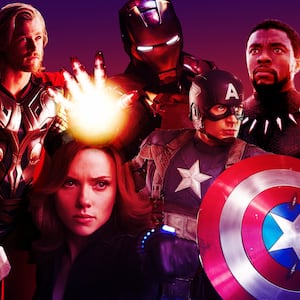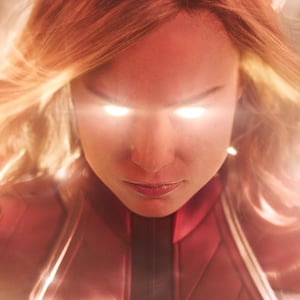Thanos may have murdered half the universe—including many fan-favorite superheroes—at the end of Avengers: Infinity War, but the Marvel Cinematic Universe is as healthy as ever thanks to Avengers: Endgame, which opened this weekend to record-breaking numbers. That’s certainly deserved since it’s the best MCU film to date, as well as the stellar culmination of an 11-year undertaking that’s resulted in 22 films, dozens of characters, and billions of dollars in profit. An extravaganza that hits its humorous, exhilarating and poignant notes with expert precision, directors Joe and Anthony Russo’s three-hour saga about family, sacrifice and heroism is, in the final tally, an epic triumph in every respect, bringing to a close one chapter of the franchise even as it clears a forward path for its beloved characters.
Which, naturally, begs the question: where does that path lead?
[Major spoilers follow]
Answering that question requires a discussion of Avengers: Endgame’s most significant moments—of which there are many. As those who’ve seen it now know, things get off to a fast start with a brooding group of Avengers (accompanied by Brie Larson’s Captain Marvel) finding Thanos (Josh Brolin) at his remote hideaway. There, they learn that his actions are irreversible. Which is bad news for everyone, Thanos included, since it compels Thor to “aim for the head”—and decapitate the Mad Titan.
Cut to five years later, and time travel via the Quantum Realm (thanks, Ant-Man!) provides the remaining Avengers with an opportunity to atone for their failure to stop Thanos’ “Snapture.” By taking trips back to some of their prior exploits, the heroes attempt to recover the not-yet-in-Thanos’-possession Infinity Stones. Iron Man (Robert Downey Jr.), Captain America (Chris Evans), Hulk (Mark Ruffalo) and Ant-Man (Paul Rudd) revisit the “Battle of New York” seen in 2012’s Avengers; Thor (Chris Hemsworth) and Rocket Raccoon (Bradley Cooper) head to Asgard circa 2013; War Machine (Don Cheadle) and Nebula (Karen Gillan) visit Morag, the site of 2014’s Guardians of the Galaxy intro scene; and Hawkeye (Jeremy Renner) and Black Widow (Scarlett Johansson) journey to Vormir, still presided over by the specter of Red Skull (Ross Marquand).
Those expeditions, as well as Iron Man and Cap’s pit stop at a 1970 New Jersey Air Force base, are marked by cameos aplenty involving the likes of Thor’s mom Frigga (Rene Russo) and former girlfriend Jane Foster (Natalie Portman), Iron Man’s dad Howard Stark (John Slattery), and Cap’s eternal flame Peggy Carter (Hayley Atwell). Courtesy of Nebula (and a mind-meld with her past self), they also provoke a confrontation with Thanos himself, who learns of the Avengers’ plan to stop his successful future apocalypse, and endeavors to get in their way. That he does, eventually touching down on Earth to engage in what is unquestionably the most titanic superhero showdown in cinema history, featuring not only all of the aforementioned do-gooders—highlighted by Cap going mano-a-mano against the Mad Titan in an extended bout of nerve-wracking ferocity—but the “vanished,” who are resurrected (or returned from whatever void in which they were hanging out for the last half-decade) and ready for some payback.
Before that climax can take place, however, Endgame dispatches with one of its still-living A-listers: Black Widow, who like Gamora (Zoe Saldana) before her, perishes at Vormir in order to obtain the soul stone—a sacrifice she willingly makes, thereby thwarting grief-stricken Hawkeye’s desire to be the one to die. According to the rules set forth in Endgame and Infinity War, this demise (like that of Vision’s) is permanent, as evidenced by the fact that Gamora isn’t resurrected at film’s end; instead, a younger past version of Gamora winds up in the present, and takes her older dead self’s place. What that means for the impending stand-alone Black Widow film (being helmed by Cate Shortland, and co-starring Florence Pugh, David Harbour and Rachel Weisz) is anyone’s guess. But one can assume the movie won’t be set in the current MCU timeline, but rather in the past—perhaps as an origin story.
These turns of events do mean Guardians of the Galaxy Vol. 3 will boast a full roster, plus one—Thor, who at the conclusion of Endgame joins up with the ragtag interstellar team, much to the hilarious chagrin of Star Lord (Chris Pratt). That should create a cornucopia of novel comedic opportunities for writer/director James Gunn’s threequel, while Spider-Man: Far From Home (due July 2) will undoubtedly proceed as normal, now that the wall-crawler (Tom Holland) is back in high school alongside best friend Ned (Jacob Batalon). And all is well in Wakanda too, as Black Panther (Chadwick Boseman) is once again on the throne, surrounded by his mother Ramonda (Angela Bassett), sister Shuri (Letitia Wright), and right-hand badass Okoye (Danai Gurira).
Of course, the “vanished” only achieve their resurrections thanks to the exploits of Iron Man, who in the climactic battle swipes the Infinity Stones from Thanos’ gauntlet and, in a snap (“I. Am. Iron Man”), turns the purple villain and his alien minions to dust. Wielding such power, however, brings about the fate fans have been dreading: with wife Pepper (Gwyneth Paltrow) and apprentice Spidey by his side, Iron Man dies from his Infinity Stones wounds, thus closing the book on this phase of the MCU, of which he was always the central, uniting figure.
As if that weren’t a definitive-enough ending, Cap then heads off to return the Infinity Stones to their respective timelines. Instead of reappearing seconds later as his same youthful self, he reemerges as an old man, and promptly hands over his shield—and the reins to the Captain America title and position—to Falcon (Anthony Mackie). In case the reason for his geriatric condition wasn’t already evident, Falcon spies a wedding ring on Cap’s hand. While he won’t tell Falcon about his bride, preferring to keep the memory to himself, the film immediately segues to the 1940s, the Russos’ camera gliding up to the window of a house, where inside Cap is dancing with Peggy, the two reunited across space and time for an impossible happily-ever-after. It’s a grace note that finishes Evans’ run as the character, and paves the way for Mackie to someday don the Stars and Stripes…albeit not before he completes his duty in the upcoming Disney+ series Falcon and Winter Soldier.
By permanently dispatching/retiring Downey Jr. and Evans, its two biggest characters (and stars), Endgame makes clear that some stories—even serialized ones that are as lucrative as any in entertainment history—ultimately come to an end. It’s a shrewd move that brings both decisive finality and promises unpredictable new adventures to come. And in doing so, it confirms that, regardless of whether the future MCU continues as an intertwined series of films, or functions as a looser collective of stand-alone efforts marked by the occasional crossover, the studio has set a new standard for interconnectivity—not to mention thrilling, amusing, tear-jerking, larger-than-life superhero fantasy.
Plus, it also puts to rest the burning question of who has the MCU’s best derrière. Closure, indeed.








